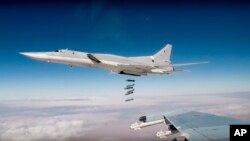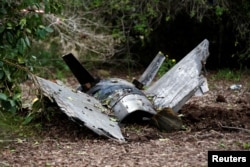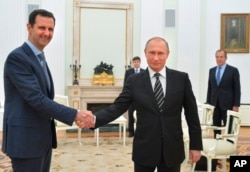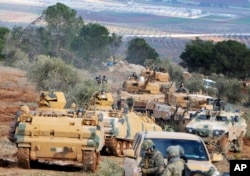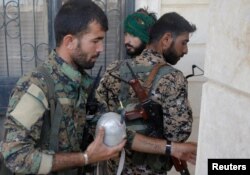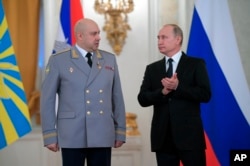Russia has played a decisive role in saving the regime of Syrian President Bashar al-Assad from ouster, but every week Moscow is finding it harder to arbitrate the winding down of a seven-year-long conflict that may have entered its most dangerous phase.
The biggest challenge facing the Kremlin is juggling the demands of the various players in Syria — those it is allied with or keen to improve ties with — amid mounting risks of the conflict spilling across borders and spreading to the wider Middle East.
The flare-up between Israel and Iran last Saturday, during which an Iranian drone and an Israeli warplane were downed and intensive Israeli bombing of Syrian air defense batteries and Iranian bases ensued, was a sharp reminder, say analysts, of how difficult it is for Moscow to control events in Syria and to capitalize on its intervention to expand Russian influence across the Middle East.
Russia is now grappling with problems similar to those the United States encountered in the past in Iraq, say analysts.
“You break it, you own it,” U.S. General Colin Powell warned President George W. Bush on the eve of the U.S.-led invasion of Saddam Hussein’s Iraq. Moscow didn’t start the war in Syria but by launching an intervention in September 2015 to prop up the Assad regime it has ended up having an ownership role — and facing as a result unintended consequences amid the risk of escalation and clashes between the many foreign powers now sucked into the conflict.
At every turn Moscow is having to try to head off confrontations between its friends and those it is seeking to befriend — as it did last week in organizing conciliatory messages between the Syrians and Israelis to stop the flare-up from turning into something even more deadly.
Turkish front
The risks were on display again this week, with Assad apparently threatening to send troops into the Kurdish enclave of Afrin to help Syrian Kurds defend it from assault by Turks and allied Syrian rebel militias.
On Monday, Syrian state media announced that pro-Assad forces were poised to enter the enclave to support the Kurdish YPG militia — a move that would see Turkish and Syrian government forces square off. That would dash Russian hopes of securing a breakthrough in a tortuous Syrian peace process the Kremlin has been overseeing.
Turkish deputy prime minister Bekir Bozdag says Syrian state-run media reports of pro-Assad "Popular Forces" preparing to enter Afrin had not been confirmed by officials in Damascus. But clearly Ankara remains anxious that Assad may decide to make a move. Bozdag added a warning: “Any decision by the Syrian regime to send forces into Afrin to support PYD/YPG terror organizations or any step taken in this direction will have disastrous consequences for the region.”
As the Russian military intervention unfolded in Syria in 2015, Russian leader Vladimir Putin pledged it would be quick and decisive. But after two-and-a-half years Russia remains militarily involved, conducting airstrikes on anti-Assad rebel holdouts as well as being diplomatically ensnared as a referee between squabbling external forces that are upping their involvement in Syria. In the last few weeks Iranian-backed militias shelled a Turkish military convoy; Russians were killed in eastern Syria in clashes between Assad’s force and the Kurds triggered American airstrikes.
“I think a lot of people in Moscow are asking the question, ‘what is the exit strategy' for Russia in Syria, according to analyst Maxim Suchkov. “There is a genuine desire to get this all on a track of political settlement and to start monetizing Russian achievements in Syria and other parts of the region, meaning in terms of political, financial, energy and arms deals — to take the opportunity of the moment while there is this view of Russia being a new sheriff and decisive force” in the region, he argues.
In search of exit strategy
But he says it is difficult to see how Russia can broker a political settlement to the multi-sided conflict when Assad now appears less controllable by Moscow and Iran, the Kurds, Turkey and Israel — a country Moscow has been courting, have very different views on the Syrian endgame.
In a recent paper for the Russian International Affairs Council (RIAC), a Moscow-based think tank partly sponsored by the Russian Foreign Ministry, analysts Andrey Kortunov and Ivan Timofeev warned that “contradictions both within Syria and among external players” — especially over Iran’s expanding influence in the region and Turkey’s stance on the autonomy ambitions of Syria Kurds — risks disrupting Kremlin plans and stretching Moscow’s efforts to keep a lid on things.
Earlier this month, Russian efforts to secure a breakthrough in turbulent peace talks in Sochi fell apart with the main Syrian opposition groups boycotting the negotiations and Russian officials being heckled by some participants.
In January, Putin declared that Moscow’s intervention in Syria had accomplished its mission, claiming the main goal of vanquishing the Islamic State terror had been achieved. But Russia remains bogged down in a complex conflict that refuses to be brought to an end.




